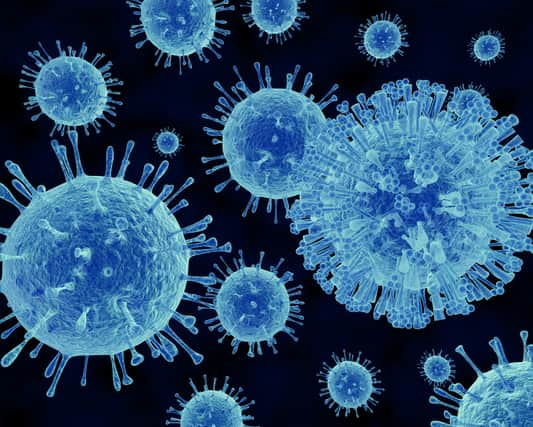These are the warning symptoms of flu and norovirus parents need to know - and how to stop the viruses spreading


As is the case every year, cases of the flu and norovirus are on the rise.
But while the two diseases may have similar symptoms, they are caused by different viruses, and have different treatments.
What is Norovirus?
Advertisement
Hide AdAdvertisement
Hide AdThe NHS describes the virus as “a stomach bug that causes vomiting and diarrhoea. It can be very unpleasant, but usually goes away in about two days.”
People regularly contract the virus from eating contaminated food, having contact with an infected person, not washing hands and surfaces.
The common symptoms of norovirus are:Feeling sickVomitingDiarrhoeaA high temperature (38C or above)A headacheAching arms and legs.
How to stop it spreading
There is no fool-proof way to prevent yourself from contracting noroviruses, but regularly and thoroughly washing your hands with soap and water helps reduce your risk.
Advertisement
Hide AdThe NHS says that people should properly rinse fruit and vegetables before cooking with them.
Advertisement
Hide AdContrary to popular opinion, while alcohol hand gels are effective against bacteria, they cannot help prevent the spread of noroviruses.
If you are unlucky enough to catch norovirus, the NHS advises you to stay at home for two days after your symptoms go. This helps make sure you are no longer infectious to your friends and colleagues when you return to work.
What is flu?
Flu is an illness caused by the Influenza virus. While it is unpleasant, the NHS says most people can recover from the flu’s symptoms without visiting their GP.
Advertisement
Hide AdSymptoms include:A sudden fever – a temperature of 38C or aboveAn aching bodyFeeling tired or exhaustedDry coughA sore throatA headacheDifficulty sleepingLoss of appetiteDiarrhoea or tummy painFeeling sick and being sick
The NHS says sufferers can get better more quickly by resting as much as possible, staying warm, and getting plenty of sleep. Over-the-counter medicines like paracetamol and ibuprofen can help treat some of the symptoms.
Advertisement
Hide AdBecause flu is caused by a viral rather than a bacterial infection, antibiotics will not help relieve symptoms, or speed up your recovery.
Help prevent the spread by:
Washing your hands often with warm water and soap.Using tissues to trap germs when you cough or sneeze.Binning used tissues as quickly as possible.
Can I get the flu jab?
Advertisement
Hide AdYou are entitled to a flu jab if you you were born on or before 31 March 1955, meaning you will be aged 65 or over on 31 March 2020.
If you're currently 64, but will be 65 on 31 March 2020, you qualify.
Other groups also qualify for a jab, and the vaccine is routinely given on the NHS to people with certain medical conditions, pregnant women, children aged 2 and 3, children in primary school, and front line health or social care workers.
Advertisement
Hide AdThe flu jab is perfectly safe and is the best protection we have against the virus. That being said, receiving a vaccine doesn't 100 per cent guarantee that you'll be flu-free. But if you do get the flu, it's likely to be milder and shorter-lived.
Serious side effects of the injected flu vaccine are very rare, but reports of mild fever and aching muscles for a couple of days after are common.